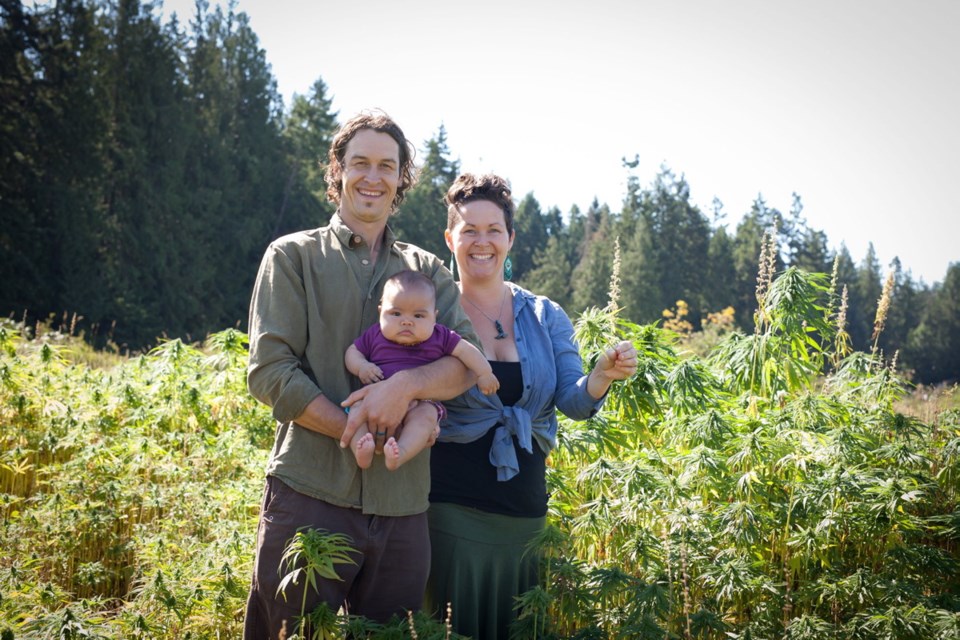A Vancouver Island farmer is mounting a new effort to promote growing industrial hemp as demand for the products made from the crop increases.
Area farmers are expressing interest in growing hemp, said Blake Hunter of Good Seed Hemp Co. Inc., which sells hemp hearts, oils and protein powder.
“I am excited that this plant is being grown again here and believe that it can empower young and small-scale farmers,” said Hunter. “There is so much room for growth as more people discover the amazing health benefits and multiples uses of hemp.
“Victoria and Vancouver Island are probably the most receptive places in the country for hemp [products],” Hunter added.
His crop in the Cobble Hill area follows efforts by farmers in 1998 to grow hemp on a combined 35.6 acres on the south and mid Island. But ongoing problems with thieves led at least one farmer, Vern Michell on the Saanich Peninsula, to plow under a million plants.
Industrial hemp is not the same as marijuana, which contains the drug that gets people high. But some people don’t understand the difference. That’s why Hunter keeps the specific location of his leased site secret.
Originally from Saskatchewan, Hunter is a fifth-generation farmer. Starting in 2005, he grew hemp on the family farm, using seeds for the company’s products.
Good Seed Hemp products are sold at the Farmers’ City Market in Fan Tan Alley and other retail outlets. About 35 per cent of sales are online, Hunter said, noting “almost all our customers are on the Island.”
His only hemp crop this year allowed for planting on five of his 10 acres where he anticipates harvesting 3,000 pounds of seed. Plants grow up to 1.2 metres tall.
Seeds will be processed at a Salt Spring Island facility, he said.
Hunter said he is Metis and that hemp has been a traditional crop for indigenous nations in North America.
With harvest time approaching, Hunter has put out a call for 30 volunteers to cut and stook plants prior to threshing.
Hunter is hoping that interest in learning about hemp production will encourage people to turn out. Interested people can contact him at goodseedhemp.com
Hemp is grown on about 100,000 acres in Canada, mainly on larger tracts in Saskatchewan, Alberta and Manitoba, said Kim Shukla, executive director of the Canadian Hemp Trading Alliance. The number of acres growing hemp rises by about
30 per cent a year, she said.
“Hemp is like any other commercial crop,” Shukla said. “It gets grown in areas where it makes economic sense to grow it.”
One of the largest individual producers in Canada has about 8,000 acres in the crop, she said.
Shukla said high land prices in southern B.C. make hemp a less-viable crop. However, B.C.’s Peace River area is going through a resurgence of interest in hemp, she said, noting “that is exactly where hemp would make sense.”
With production and processing growing, there is “huge room to expand ... we haven’t even touched the surface,” Shukla said. The market has been largely developed for the food sector, meaning seeds, hemp hearts and health products.
In the past three years, B.C. has exported about $200,000 worth of hemp products per year, said a statement from B.C.’s Ministry of Agriculture. The U.S. is the largest export market.
Businessman Brian Johnson, a long-time Island advocate for the industrial hemp sector, is more optimistic about the viability of local production and the chances of seeing it grown more widely in 2016. A key barrier to farming hemp locally has been the lack of a processing plant, he said.
The likelihood of seeing such a plant on the Island is “very, very good,” he said, adding that he is dealing with potential investors.
Johnson, of TransGlobal Hemp Products Corp., said plans to grow industrial hemp on 18 acres this year fell through after the death of his business partner. Other growers were deterred by the drought.
HEMP: IT’S NOT THE SAME AS MARIJUANA
• Industrial hemp belongs to the species Cannabis sativa L. Unlike marijuana, it only contains small quantities of the
psychoactive drug delta-9
tetrahydrocannabinol (THC).
• Hemp is grown for its seeds and fibre.
• About 85 per cent of hemp grown in Canada is for its seeds, used in food and health products.
• Hemp fibre has been used to make clothing, ropes and paper. The grain has been stewed, roasted and milled for food. It is used in hemp oil, protein powder, and sold as hemp hearts. Oil from the seeds has been used for cosmetics, lighting, paints, varnishes, and medicinal preparations, says Agriculture Canada.
• Hemp is a source of omega-3 and -6 fatty acids and contains amino acids.
• Growers must be licensed by the federal government. Rules require a hemp parcel to be a minimum of 10 acres.
• Hemp can be grown without fungicides, herbicides and pesticides.
• Hemp matures in three to four months.



